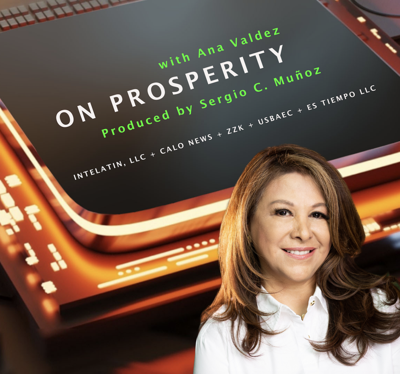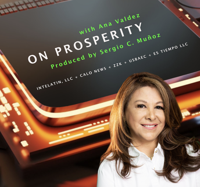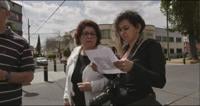
The folks at CALÓ are writing personal columns on what Caló means to them. I have this perception from reading them and from listening to the new managing director that they care about Los Ángeles. They also care about the five million Latina/os in Los Angeles. They might truly believe that we are one community.
I remember years ago, I was talking to Fernando Espuelas about Jorge Ramos for an article I published on the 50th anniversary of Univisión. Fernando was explaining to me the difference between an immigrant mentality and a native mentality. He thought Jorge had an immigrant mentality that would not translate to the youth in the USA.
Even though I have spent considerably more years in Los Angeles than anywhere else in the world, I still have an immigrant mentality. Specifically, as a Mexican immigrant, I do not believe Latina/os living in the U.S.A. are one community. I don’t even believe that we are two communities (the immigrant and the native). So, upon interviewing Ana Valdez, president and CEO of the Latino Donor Collaborative, I walked away with one thought. She didn’t make it the focus of her responses, it was just one thought that was bold and personal and I share it completely. She said to me:
“When I left Mexico, I went to Europe and in Europe, Mexicans are adored. From our food to our culture to our pyramids to our kindness. So I always felt like a young and beautiful Aztec princess. They would love everything I did and I felt so good. When I got to Washington, D.C., I had a lovely landing because I was associated with the diplomatic corps. It was such a cosmopolitan and sophisticated mentality and it bled onto me and again, I felt good. Then I moved to L.A. and it was shocking. People would see me and ask me how I got to Beverly Hills from East L.A. I was so innocent that I didn’t notice at first. Then, I began to notice. Then, I began to respond with validators: I have a Master’s. I worked at the United Nations. I worked at the White House. Have you been able to accomplish any of those things? Have you advised presidential candidates to the U.S.A., or members of the U.S. president's cabinet? When they said, 'No,' I forced them to understand who I was and to not be judged by my appearance or by my accent. For me, Los Angeles is the most discriminatory anti-Mexican city in the world. Even my Latino and non-Latino Angeleno friends have their own preconceived ideas about who Mexicans are. This has given me my purpose: To close the gap between who Latinos in the United States really are and what people perceive us to be.”
I stand by Ana’s quote. I’ll go so far as to say that if you do not think this quote is true, then you do not really know Los Angeles and you have no business trying to unify the community. You might just be lost in a fantasy but it is nothing like Aztlán.
In this episode of "On Prosperity," Ana Mendez shares her inspiring journey as a Mexican immigrant living in Los Angeles. Through heartfelt anecdotes and personal experiences, Ana delves into the challenges and triumphs she faced while navigating life in a new country.
Read the full interview on www.calonews.com
Sergio: Please describe your childhood home?
I was born in Mexico City in Las Lomas de Tecamachalco. Our house was big, white, it was designed and built by my uncle who was a great architect. We had a beautiful indoor garden, lots of windows, lots of light, and wood on the outside. When you would go from the living room to the other rooms, you would walk these rock pathways. I lived in this home with my mother and father, sister and brother. I had my own room. We had lots of beautiful trees and gardens on the property. It was a very nice childhood but there was a lot of conflict in the household. My parents got divorced and remarried to each other and then divorced again and remarried to my step-father and to my step-mother. So, within all that privilege and all of that niceness above the surface, the conflict on the inside forced my sister and I to relocate alone to an apartment in a surrounding colonia. This was so unheard of in Mexican society that we kept it secret from our friends and boyfriends. Nobody knew that we had moved out of our family home. Regardless, I stayed in Mexico City until I left to pursue my Master’s degree in Madrid.
Sergio: When did you begin to fantasize about prosperity and did you tie your vision to an image of a home?
I began to notice social class differences at the age of six. I remember the night, it was Christmas Eve. I was crying bitterly because all of the workers in our house couldn’t eat at the same table as us. I became totally aware of it. My mom had a practical approach to the difference and didn’t make a drama out of it. One of my grandmother’s housekeepers even got a Master’s from Harvard, I promise it's a true story. My family felt at peace with it but I knew that we were fooling ourselves. At the same time, society was so harsh in a lot of different ways and if I was a revolutionary at every stage of my life, I would have been an outcast. I had to learn to play the game regardless of my feelings. However, it is interesting to note the difference in my outlook present-day. I am nothing like how my parents and grandparents were. I developed a guilt for the privilege that I benefited from and I developed a theory that there should be opportunities for everybody regardless of your social class. This is the work that I am performing at the Latino Donor Collaborative to create an awareness for how hard Latina/os work and enrich life in the USA.
Sergio: What is your immigration story?
Yes, I came to the United States after receiving my Master’s. I was living in Geneva and I arrived in Washington, D.C. I had many reasons for wanting to be in the United States. I was doing a thesis for a PhD and I wanted to create a change in mass media. I had a nice, soft landing in D.C. because I was hired as a volunteer at The White House and then, I became an employee in the Clinton re-election transition team. I got a Presidential appointment to work for the Department of Energy when Federico Peña was there. I would have stayed in D.C. if I had not met my husband, who was living in Los Angeles.
Sergio: At that stage in your life, were you beginning to consider purchasing real estate?
I purchased an apartment in Mexico City. I still have it rented out. When I go back to Mexico City, I prefer to be with family and not alone in my apartment, so that was my first experience in homeownership. When I was starting out in the United States, a few years after arriving, I purchased a home in Los Angeles upon getting married. This is where we live today. I didn’t have long term plans to stay in the United States so I think I ended up staying just because I met my husband. My husband’s Mexican American family has been in the United States since the 1500s.
Sergio: What does your home look like present-day?
It is a one-story creamy orange colored home in the middle of Los Angeles. We have a front yard and the inside is designed to look like it's in Mexico City with all of our Dupuis furniture. I live there with my husband and my two children but they are now both in college. I have a nice office on the property where I can do my work.
Sergio: What do you think about the concept of prosperity as Ana today vs the Ana of your youth?
I think I am the same person. I always felt uncomfortable with our level of privilege. But, truthfully, I still enjoy the good life. I just don’t think that you should put people down because they don’t have the same privileges. I believe that the best way to be is to offer opportunities to everybody. Privilege should come from the work you have done. I know it’s not the norm but I wish it was. I still see it everyday. My work at the Latino Donor Collaborative is to give anybody the access to the good life and to help them reach their American Dream. The narrative of the underserved Mexican should be a thing of the past. The immigrant Mexican that comes to this country and works hard should have every privilege afforded to them.
Sergio: Was there somebody in your life that had the good life that you looked up to and made their American Dream come true?
Yes, when I was in the White House, there was an executive that was a special economic advisor for Bill Clinton. She had curls in her hair. She had dark skin. She didn’t wear makeup. She dressed in traditional Mexican style skirts. She wore huaraches. I remember thinking: I want to live in this world where this woman is the big deal that she is in the White House.
Sergio: How do you feel about Los Angeles in respect to the good life?
When I left Mexico, I went to Europe and in Europe, Mexicans are adored. From our food to our culture to our pyramids to our kindness. So I always felt like a young and beautiful Aztec princess. They would love everything I did and I felt so good. When I got to Washington, D.C., I had a lovely landing because I was associated with the diplomatic corps. It was such a cosmopolitan and sophisticated mentality and it bled onto me and again, I felt good. Then I moved to L.A. and it was shocking. People would see me and ask me how I got to Beverly Hills from East L.A. I was so innocent that I didn’t notice at first. Then, I began to notice. Then, I began to respond with validators: I have a Master’s. I worked at the United Nations. I worked at the White House. Have you been able to accomplish any of those things? Have you advised presidential candidates to the U.S.A., or members of the U.S. President's cabinet? When they said, “No,” I forced them to understand who I was and to not be judged by my appearance or by my accent. For me, Los Angeles is the most discriminatory anti-Mexican city in the world. Even my Latino and non-Latino Angeleno friends have their own preconceived ideas about who Mexicans are. This has given me my purpose: To close the gap between who Latinos in the United States really are and what people perceive us to be.
Sergio: Where is Mexico in your mind now?
I still have my apartment in Mexico City and I also have an apartment in the Región Maya. It is so pretty. I love seeing the ocean in Tulum.
Sergio: How did you learn about purchasing real estate, inheritances, trusts?
I am not a lawyer, I needed help understanding all the paperwork, so I hired experts to teach me over the years.











(0) comments
Welcome to the discussion.
Log In
Keep it Clean. Please avoid obscene, vulgar, lewd, racist or sexually-oriented language.
PLEASE TURN OFF YOUR CAPS LOCK.
Don't Threaten. Threats of harming another person will not be tolerated.
Be Truthful. Don't knowingly lie about anyone or anything.
Be Nice. No racism, sexism or any sort of -ism that is degrading to another person.
Be Proactive. Use the 'Report' link on each comment to let us know of abusive posts.
Share with Us. We'd love to hear eyewitness accounts, the history behind an article.